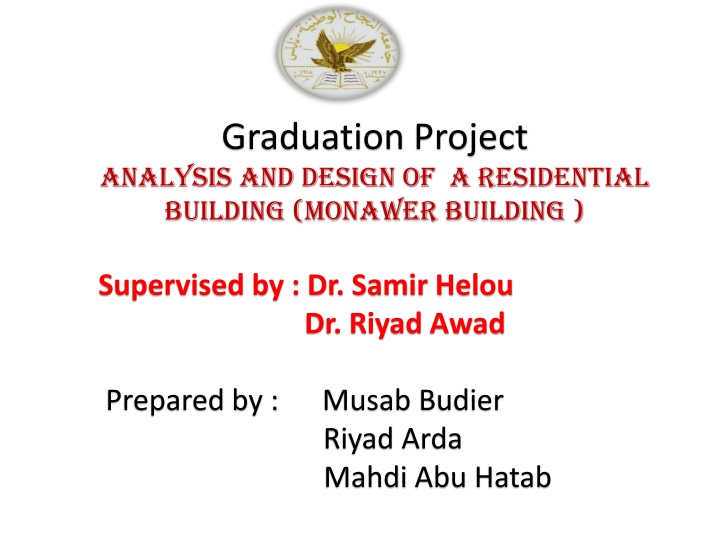
Residential Building Design Project | Monawer Building Analysis
"Explore the detailed analysis and design process of the Monawer Building, a residential structure featuring seven floors, including basement and water tank. The project covers slabs, beams, columns, footings, walls, and structural dynamics. View floor plans, slab designs, and cross-section details for insight into this comprehensive architectural endeavor."
Download Presentation

Please find below an Image/Link to download the presentation.
The content on the website is provided AS IS for your information and personal use only. It may not be sold, licensed, or shared on other websites without obtaining consent from the author. If you encounter any issues during the download, it is possible that the publisher has removed the file from their server.
You are allowed to download the files provided on this website for personal or commercial use, subject to the condition that they are used lawfully. All files are the property of their respective owners.
The content on the website is provided AS IS for your information and personal use only. It may not be sold, licensed, or shared on other websites without obtaining consent from the author.
E N D
Presentation Transcript
Graduation Project Analysis and design of a residential building (Monawer Building ) Supervised by : Dr. Samir Helou Dr. Riyad Awad Prepared by : Musab Budier Riyad Arda Mahdi Abu Hatab
I. Compiling of information which were studied in several years of studying and styling it in a study project. II. Analysis and assessment of an existing building 2
Introduction Analysis and design of slabs Analysis and design of beams Design of columns Design of footings Design of walls Dynamic analysis of structure Analysis and design of water tank 3
Project Description Seven floors residential building consisted of : Basement floor (377 m ) Six typical floors each one has an area of (291.3m ) Water tank has a volume of (192m ) 4
Design of Slabs Design of slab of basement floor Structural system : Two way solid slab Slab thickness = 17 cm . Analysis method : 3D model by SAP program 7
Design of Slabs Design of ribbed slab Structural system : One way ribbed slab . Slab thickness = 30 cm Analysis method :1D and 3D model by SAP program 10
Slab Details 12
Design of Beams Beams in basement floor Beam number Beam width(cm) Beam depth(cm) Bottom steel Top steel Stirrups B1 40 50 6 16mm 5 20mm 1 10mm/100mm B2 40 50 6 20 mm 8 20mm 1 10 mm / 100mm B3 40 50 6 20 mm 8 20mm 1 10 mm / 100mm B4 40 50 6 20 mm 8 20mm 1 10 mm / 100mm B5 40 50 6 20 mm 8 20mm 1 10 mm / 200mm B6 40 50 6 16mm 5 20mm 1 10mm/100mm B7 30 40 3 16mm 5 16 mm 1 10 mm / 150mm B8 30 40 3 16 mm 5 16 mm 1 10 mm / 150mm B9 30 40 5 16 mm 4 16 mm 1 10 mm / 150mm B10 30 40 5 16 mm 4 16 mm 1 10 mm / 150mm 14
Beams in Typical floors Beam name width(m) depth(m) Top steel middle steel bottom steel stirrups B1 0.3 0.3 4 12 4 12 1 10/200mm B2 0.5 0.3 5 12 3 16 5 12 1 10/200mm B3 0.5 0.3 5 12 3 16 5 12 1 10/200mm B4 0.5 0.3 4 12 4 12 1 10/200mm B5 0.5 0.3 4 16 4 14 1 10/200mm B6 0.3 0.3 4 12 4 12 1 10/200mm B7 0.3 0.5 3 20 2 16 4 16 1 8/150mm B8 0.7 0.3 6 16 5 20 1 8/150mm B9 0.7 0.3 5 16 6 16 1 8/150mm B10 0.7 0.3 6 20 2 16 1 10/100mm B11 0.7 0.3 8 16 8 14 1 8/150mm B12 0.5 0.3 4 20 2 16 4 16 1 8/150mm 17
Reinforcement Details of representative frame in Typical floors frame B12 18
Design of columns Summary table of columns design Group(3) 20*50 Group (1) Group (2) Dimensions (cm) 30*60 40*70 8 16 mm Reinforcement 10 16 mm 14 16 mm 1 8 /200 mm stirrups reinforcement 1 8 /200 mm 1 8 /200 mm 4 cover (cm) 4 4 20
Footings Types of footings are used : 1) Isolated footing 2) Combined footing 3) Mat footing 4) Wall footing Bearing capacity of soil = 250 KN/m 23
Shear wall design Thickness of shear wall = 25 cm Height (m) Reinforcement(mm2) 0.0-3.25 1200 (6 16m/layer) 3.25 -8.25 1200 (6 16m/layer) 8.25-11.5 1000(5 16m/layer) 11.5-14.75 1000(5 16m/layer) 14.75-18 1000(5 16m/layer) 18-21.25 800(5 14m/layer) 21.25-24.5 800(5 14m/layer) 24.5-27.5 800(5 14m/layer) 27
Basement wall design Wall height = 3.25 m Wall thickness = 30 cm Unit weight of the soil is 18 KN/m3 Surcharge load = 20 KN/m2 Bearing capacity of the soil = 250 KN/m 29
Stairs Design Loads Slab own weight of staircase = 5 KN/m2 Superimposed dead load = 5 KN/m2 Live load = 5 KN/m2 Slab Thickness =20cm 31
Dynamic Analysis 1) Period calculations of structure 2) Base shear calculations 3) Analysis of building subjected to time history earthquake 33
1.Fundamental Period of the structure Period in X-direction By Rayleigh s method: 34
Tx by SAP modal % of error =19% 35
Period in y-direction By Rayleigh s method : 36
Ty by SAP Modal % OF ERROR =5% 37
2.Base shear Three methods : Equivalent lateral force method (IBC 2003). Response spectrum dynamic analysis method Time history analysis method and structure is subjected to Elcentro earthquake. 38
Equivalent lateral force method Base shear force (V): V=Cs W All parameters used for equivalent force method are: Area: Nablus Soil type: B S1=0.2 Ss= 0.5 Fa = Fv = 1 SDs = 2/3(Ss*Fa) = 0.333 SD1 = 2/3(S1*Fv) = 0.1333 Cs=0.051 VX =0.051*(2665*9.81) =1333.3 KN 39
Ss S1 40
Summary table Base shear calculation Method Equivalent lateral force base shear in X-direction(KN) base shear in y-direction(KN) 1368 1526 Response spectrum 920.2 1164.8 Time history 1139.8 1478.6 41
4.Analysis of structure subjected to earthquake (Elcentro EQ) Checks of columns - Axial loads column No. (Comb.1) Axial load (KN)-Gravity combination Axial load(KN) EQ combination (comb.2) govern combination 1 1689 1698 comb.(2) 2 2120 2046 comb.(1) 3 2087 2027 comb.(1) 4 1693 1712 comb.(2) 5 1699 1622 comb.(1) 6 2050 1857 comb.(1) 7 2022 1831 comb.(1) 8 1700 1614 comb.(1) 9 1760 1705 comb.(1) 10 2171 1964 comb.(1) 11 2086 1852 comb.(1) 12 2144 1911 comb.(1) 13 2382 2143 comb.(1) 14 2001 1921 comb.(1) 15 2224 2124 comb.(1) 16 3109 2868 comb.(1) 17 3291 3010 comb.(1) 18 3286 3019 comb.(1) 19 3123 2897 comb.(1) 42 20 2243 2124 comb.(1)
Bending moment diagram For interior frame U=1.2 DL+1.6 LL 43
Bending moment diagram For interior frame U=1.2 DL+1 LL +1.4 E 44
Water Tank Volume : 192 m Dimensions : Height = 5m width= 5.5 m Length = 7m Wall thickness = 30 cm
The END The END Thank you for your Attention Thank you for your Attention Any Questions ? Any Questions ? 48






















